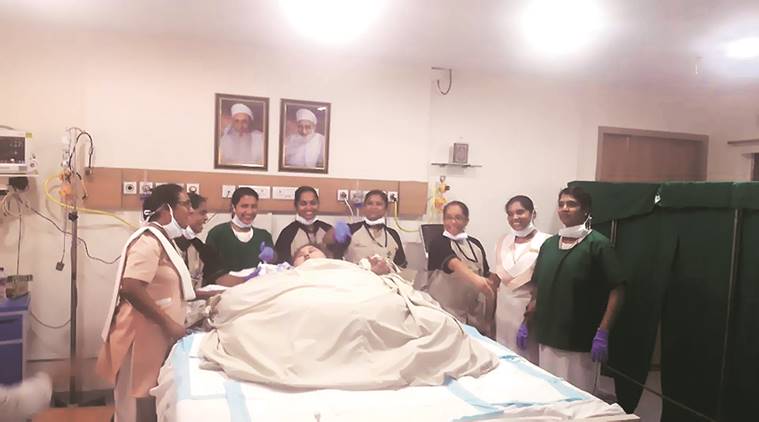Stay updated with the latest - Click here to follow us on Instagram
Doctors detect gene mutation responsible for Eman’s obesity
Eman's current diagnosis shows she suffers from leptin receptor deficiency owing to the gene mutation.
 Eman Ahmed at Saifee Hospital.
Eman Ahmed at Saifee Hospital.
A detailed gene analysis on Eman Ahmed, the Egyptian woman undergoing weight loss treatment in Mumbai, has assigned as the cause of her obesity a rare mutation in the LEPR gene. Doctors have detected “homozygous missense variant” in the gene, a condition they claim has been seen for the first time causing obesity. The genome analysis, done with assistance of US-based experts and Core Diagnostics, studied 91 different genes that are usually responsible for obesity. The 36-year-old woman, who weighed an estimated 500 kg on her arrival in India in February, has already undergone a bariatric surgery and shed over 160 kg.
She currently weighs 340 kg. Last week, doctors at Saifee Hospital claimed she was able to prop herself up on the bed without any external support, though other medical issues continue to trouble her, including paralysis, kidney ailment, diabetes, hypertension and insomnia. Her current diagnosis shows she suffers from leptin receptor deficiency owing to the gene mutation. Due to this, the brain signals for a sense of hunger and satiety are disrupted causing excessive food intake and mounting weight. In Eman’s case, since her early life her brain has perceived she is constantly starving.
The gene results have brought both clarity and difficulty in assessing her future treatment, admits the team of over 16 doctors treating her. Bariatric surgeon Dr Muffadal Lakdawala says there is no definitive treatment for such a gene disorder. “The operation that she recently underwent may have some beneficial effects but does not deal with the underlying problem. New drugs are being developed, which may have some promise in this situation, but it is very early days for these drugs,” he says.
According to bariatric surgeon Aparna Bhasker, surgery is still required in Eman’s case as drugs will not be able to alone treat obesity. Her rapid weight reduction till now has been because of fluid reduction in her body based on a controlled diet. Beyond that, chances of regaining weight are always high, say doctors. The Egyptian national is currently on a high-protein diet, getting fed soya milk and protein powder after every two hours. In a day, her food intake is limited to 1,800 calories.
“She has done extremely well post surgery but continues to remain on tube feeds because of a difficulty in swallowing fluids because of a previously suffered stroke,” says a doctor, adding that physiotherapy is on to make her fit enough to fly back home. “Later, she may need a more radical surgery, which has chances of causing malabsorption,” says Lakdawala. Malabsorption is a disorder in which intestine cannot absorb enough nutrients the disorder is sometimes triggered by bariatric procedures. Eman got restricted to her home in Alexandria (Egypt) at the age of 11 when she quit school due to growing weight. Two years ago, obesity made her bed-ridden relying heavily on her mother and sister for bathing and eating.







